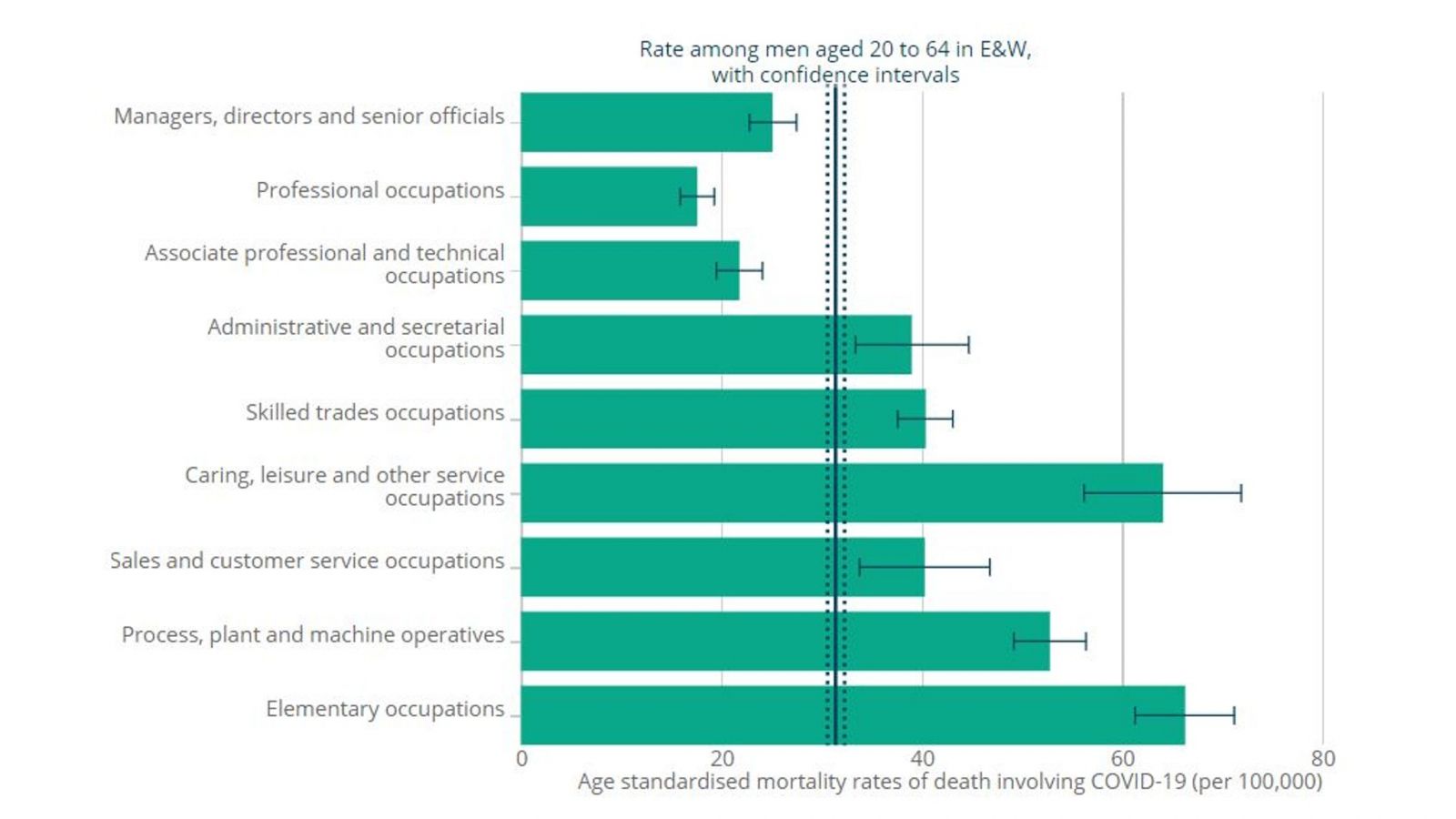25 January 2021 | Updated 04 February 2021
The Office for National Statistics has today published the latest figures regarding COVID-19 death by occupation, again revealing a high death rate in the security sector.
The ONS' key conclusion is that men working in "low-skilled" jobs, such as the care sector, service jobs and security are at most risk.
In the elementary occupations group, the occupation with the highest rate of death involving COVID-19 are those who work in process plants, with 143.2 deaths per 100,000 males (120 deaths).
Those working in security occupations had the next highest rate of death involving COVID-19, with 93.4 deaths per 100,000 males (153 deaths). Most of these deaths were among security guards and related occupations (140 deaths; 100.7 deaths per 100,000 males).

Picture: a graph from ONS showing COVID-19 mortality rates by occupational group between 9 March and 28 December 2020. Image credit: ONS
In a previous report from May 2020, a total of 2,494 deaths involving the coronavirus (COVID-19) in the working-age population (those aged 20 to 64 years) of England and Wales were registered up to and including 20 April 2020. Nearly two-thirds of these deaths were among men (1,612 deaths), with the rate of death involving COVID-19 being statistically higher in males, with 9.9 deaths per 100,000 compared with 5.2 deaths per 100,000 females (882 deaths).
Security Guards, Taxi Drivers and Chauffers
Looking at the previous 2020 data, compared with the rate among people of the same sex and age in England and Wales, men working in what the report defines as “lowest skilled occupations” had the highest rate of death involving COVID-19, with 21.4 deaths per 100,000 males (225 deaths).
Men working as security guards had one of the highest rates, with 45.7 deaths per 100,000 (63 deaths). Among men, a number of other specific occupations were found to have raised rates of death involving COVID-19, including: taxi drivers and chauffeurs (36.4 deaths per 100,000); bus and coach drivers (26.4 deaths per 100,000); chefs (35.9 deaths per 100,000); and sales and retail assistants (19.8 deaths per 100,000).
This report states that analysis does not prove conclusively that the observed rates of death involving COVID-19 are necessarily caused by differences in occupational exposure: “We adjusted for age, but not for other factors such as ethnic group and place of residence.”
Why Security Guards?
A report, commissioned by Corps Security from Perpetuity Research and Consultancy International, revealed seven key issues that may contribute to security officers having one of the highest COVID-19 death rates.
This includes age, working location, ethnicity, and working in close proximity to others.
The very nature of the role of security officers influences their risk to COVID-19. Being a frontline key worker may mean encountering conflict when trying to enforce COVID-19 guidelines and this may make social distancing more difficult. They also have to touch equipment and technology others have handled on a regular basis and may find it difficult to ensure they carry out frequent handwashing.
Many security roles are located in major cities and some of these, particularly in London, the Midlands and south-east have been particularly hard hit by COVID-19, affecting the vulnerability of those working there.
Picture: a photograph of a uniformed security guard
Article written by Ella Tansley | Published 25 January 2021
Share
Related Articles
Speech to Text Technology Could Help Communication Whilst Wearing a Face Mask
To help overcome communication issues caused by wearing face masks, Corps Security has begun a pilot scheme which equips security officers with speech to text and...
Read Full Article
Security Officer Appreciation Week – #ThankYourSecurityOfficer
A security services provider is hosting a series of thank-you visits to their colleagues to mark Security Officer Appreciation Week.
Corps Security, a security...
Read Full Article
Low City Footfall, Congestion Charge and the Effect on Security Officers
As fewer people commute to work in city centres, this will inevitably alter the role of the front of house security officer.
Theo Nicolaou, Managing...
Read Full Article
Research Shows Reasons Behind Security Staff’s Susceptibility to COVID-19
Age, working location, ethnicity, and working in close proximity to others have all been identified as factors that may contribute to security officers having one of the...
Read Full Article
Front-Of-House Strategies For Dealing With Aggressive Behaviour Post-Lockdown
It’s clear that the role of our front-of-house workforce and security staff is going to change significantly as buildings reopen.
The security guard that greets...
Read Full Article
How Is The Security Industry Protecting Its Workforce?
As safety and hygiene measures are ramped up on trains and at stations this week, security guards with crowd management training are being deployed.
Trains have been...
Read Full Article
Memorial to Transport Workers who Lost Their Lives to COVID-19 Unveiled
A new memorial in Aldgate that commemorates transport workers who passed away due to COVID-19 has been officially opened by the Mayor of London Sadiq...
Read Full Article
MPs’ COVID-19 Report Calls on Minimum Standards for Hygiene Infrastructure
MPs are recommending a series of measures to prepare the UK for future public health emergencies, resulting from an inquiry into the role of cleaning during the COVID-19...
Read Full Article
Sodexo’s Head of Health & Safety Named COVID Workplace Champion
April Harvey from Sodexo has been recognised for her role as health, safety and risk lead in the mobilisation of the first COVID quarantine facility and COVID-19 test...
Read Full Article
Improving Indoor Air Quality This Winter
During the pandemic, COVID has raised the profile of the quality of the air we breathe in our buildings – how do we maintain this priority throughout the winter...
Read Full Article


.gif)
.gif)

.gif)






.png)

.png)
